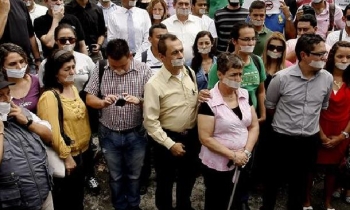Can the Internet be politically censored? Or is it essentially uncontrollable, as suggested by the apparently unstoppable downloading of music? From a technical standpoint, the answer seems to be that in a country sufficiently authoritarian, the Net can be controlled.
China is an example. The clever may find ways around things like site-blocking, but most won't. In America, child porn gets quietly shipped around, but sites dedicated to it have been shut down. Everyone knows that the FBI is watching for it.
Even in democratic and semi-democratic nations, various interests, including governments, would like to prevent expression of ideas of which they disapprove. Can the Net be censored in these countries? Yes, I think. And the effort has begun.
At the Register, the excellent British computer site, I find this: "A Hamburg [Germany] court has ruled that moderators of Internet forums are liable for content posted on their sites. The previous interpretation held that they were only accountable for illegal content they had been made aware of. The new ruling means if operators do not have enough in-house resources to monitor forums, they should reduce the scope of their business operations."
This may sound reasonable enough. A newspaper is responsible for what it prints. Why shouldn't a Web site be? Are blogs special? Maybe. Here advancing technology has blurred distinctions between private and public, between journalists and ordinary citizens. If I as a private citizen post a blog, or manage an Internet mailing list, on the one hand I am just an American expressing my political views. In a sense it's like having friends over to discuss policy.
On the other hand, my blog is instantly visible to the entire earth. This is a tad different. Similarly, if I have an Internet mailing list of 30 friends, nobody will much care. It costs little more to have a mailing list of 300,000. Web sites can reach such numbers of subscribers or readers. These readerships rival those of major media. Here we reach a spooky intersection of technology and the Bill of Rights.
The problem is that the Internet today has assumed a peculiar position. It is now the only uncensored means by which ordinary citizens can discuss anything that is not "politically correct." With the media heavily owned by small numbers of companies, a great many ideas, by no means necessarily vicious, cannot be debated. We all know what they are.
As a nation we have few ways of talking to each other. People today seldom have town meetings. We live often in isolated suburbs. Nearly the only lateral communication -- i.e., between citizens without going through the media -- takes place on the Net. It has become the electronic embodiment of the First Amendment. It is almost the only remaining bastion.
Newspapers understand libel laws and seldom transgress. Bloggers in small towns in Wyoming probably do not know the law well. Add vague "hate speech" laws potentially enforced by remote Web watchers with agendas of their own. Recently (again from Europe), I found some commission or other arguing for shutting down sites that offended "old people," women and ethnic groups. All of these policies, if enacted and enforced, will have people looking over their shoulders and trembling.
If the Internet is going to be censored in reasonably democratic countries, it will be done in the name of virtue. If free speech is to survive, the presumption must be in favor of leaving the Net alone.









